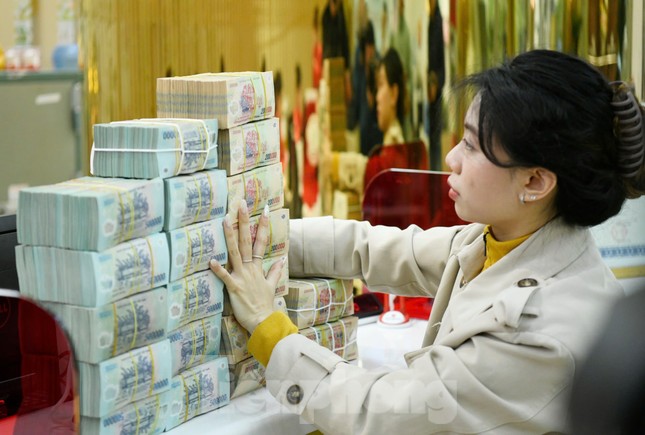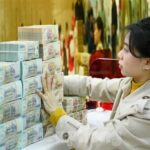22 out of 28 Banks Report an Increase in Non-Performing Loans
Agribank, a leading agricultural bank in Vietnam, has recently announced the auction of non-performing loans belonging to several companies. Specifically, these include the Hoang Kim Joint Stock Company, TTT Vietnam Investment, Development and Trade, and Tu Liem Trading and Services, with outstanding debt totaling over VND 300 billion as of March 31, 2025. This comprises more than VND 226 billion in principal debt and over VND 77 billion in interest.
Additionally, Agribank’s Ha Thanh branch is handling bad debts from Hung Anh Ltd., Dai Minh JSC, Nhuận Hiển Ltd., Tam Duong Infrastructure Investment and Construction, and Hong Quan Building Materials, totaling over VND 416 billion as of the same date. This includes more than VND 308 billion in principal debt and over VND 107 billion in interest.
Furthermore, the bank is dealing with non-performing loans from Hop Thinh Phat Vinh Phuc JSC, Thai Duong Infrastructure Investment and Development, and Ha Tinh Building Materials No. 6, amounting to nearly VND 333.8 billion as of March 31, 2025.

Vietnamese banks face challenges in dealing with bad debts.
Two other companies, QA International Investment and Trading, and Thanh Cong Metal and Supplies, owe the bank more than VND 257 billion as of March 20, 2025.
BIDV’s Thanh Do branch is also in the process of selling the debt of Hang Ha JSC, which amounts to over VND 730 billion as of October 31, 2024, including nearly VND 433.7 billion in principal and almost VND 296.4 billion in interest and penalty fees.
These debts are secured by assets such as real estate, factories, and machinery.
Financial reports from listed banks show that non-performing loans in the sector have increased by 18.5% year-on-year and over 16% compared to the end of 2024, totaling more than VND 266 trillion. This equates to an increase of approximately VND 37 trillion.
Notably, 22 out of 28 banks have reported an increase in non-performing loans compared to the previous year. The number of banks with a non-performing loan ratio above 3% has risen to 8, up from 7 at the beginning of the year. All categories of non-performing loans have increased, with substandard loans (Group 3) rising by over 37% and doubtful loans (Group 5) increasing by nearly 13%.
Mr. Nguyen Quoc Hung, Secretary-General of the Vietnam Bankers Association, stated that the total amount of non-performing loans in the economy has exceeded VND 1 quadrillion. This “dead capital” is wasting resources in a capital-scarce economy and contributing to high lending interest rates. Additionally, collateralized assets associated with these loans cannot be utilized due to legal risks.
According to Mr. Hung, synchronizing the legal framework for handling bad debts, including amending the Law on Credit Institutions and issuing a new circular on debt management and asset exploitation (AMC), will stimulate the development of the debt market. Currently, nearly 50% of bad debts are handled by banks through risk provisions. However, international experience shows that the most effective and sustainable way to deal with bad debts is to develop a vibrant debt trading market.
The expert suggested encouraging the establishment and expansion of debt trading companies, attracting foreign investors, and creating a favorable legal corridor for the debt market, along with legalizing Resolution 42.
Strategies for Addressing Non-Performing Loans
The State Bank of Vietnam has recently released a draft law amending and supplementing several articles of the Law on Credit Institutions to legalize bad debt handling regulations, including the seizure of collateralized assets for banks.
Additionally, the State Bank has published a draft circular regulating the activities of AMC-related subsidiaries and affiliates of credit institutions. According to the draft, the debts that AMCs can manage and exploit under authorization include non-performing loans, both on and off-balance sheet. For debts purchased by AMCs, they include non-performing loans arising from lending activities, guarantee payments, and financial lease receivables, both on and off-balance sheet.
The State Bank of Vietnam stated that the activities of credit institutions have become more diverse compared to the time when Decision 1390/2002 was issued. Therefore, expanding the scope of debt acceptance, management, and handling under AMC authorization is necessary to ensure sufficient resources for handling bad debts arising from the activities of credit institutions.
Globally, AMCs are established in various forms to handle bad debts and restructure the assets of commercial banks. AMCs of commercial banks typically focus on managing internal non-performing loans or purchasing regular loans in special cases, such as when a company with a good loan encounters temporary financial difficulties. In such cases, the AMC may purchase the debt and restructure or resell it when the company recovers, preventing it from becoming a non-performing loan.
“Specifying the scope of debts that can be received, managed, and handled under authorization, as well as those that can be bought and sold, ensures that debt management companies focus on dealing with non-performing loans. This also prevents credit institutions from taking advantage of debt management companies to buy and sell debts, thereby altering their bad debt data and situation,” affirmed the State Bank of Vietnam.
Unleashing the Power of Capital: Unveiling the Enormous ‘Dormant Capital’
The magnitude of non-performing loans in the economy has surpassed a staggering threshold of 1 million billion Vietnamese dong. This colossal amount of “dead capital” is a wasteful burden on the economy, especially in a context of capital scarcity, and it contributes to keeping borrowing rates high.
“Revolutionary Proposal: Exploring a Special Lending Authority with a 0% Interest Rate”
The government proposes to shift the authority to decide on special lending at a 0% interest rate and without collateral from the Prime Minister to the State Bank.
“The Appointment of Mr. Nguyen Thanh Nhung as Acting CEO of Sacombank”
The Board of Directors of Saigon Thuong Tin Commercial Joint Stock Bank (Sacombank) has announced a transition in its leadership. With immediate effect, Ms. Nguyen Duc Thach Diem has stepped down from her role as Chief Executive Officer. The Board has appointed Mr. Nguyen Thanh Nhung as the new Acting CEO. Ms. Diem will continue to serve as the Vice-Chairwoman of the Board of Directors, a position she currently holds.
The Evolution of China’s Banking Strategy and Lessons for Vietnam
The Chinese banking system has undergone a strategic transformation over the past decade. Moving away from a model reliant on large-scale credit growth, fueled by real estate lending and state-owned enterprise loans, the industry has embraced a new paradigm. This paradigm shift involves a comprehensive approach to finance, diversifying revenue streams, and embracing digital transformation. This evolution reflects a conscious effort to adapt to the demands of risk management, improved operational efficiency, and sustained growth.
Governor Nguyen Thi Hong: The Bad Debt of the Credit System is Currently High and on the Rise, Posing Significant Challenges for the Banking Sector
The governor emphasized the urgency of providing liquidity support to commercial banks through special lending facilities to ensure the safety and security of the credit system. Synchronizing the legal framework for dealing with non-performing loans will facilitate capital rotation and enhance credit accessibility for citizens and businesses alike.




















